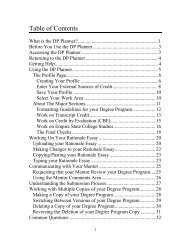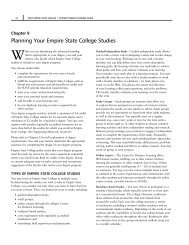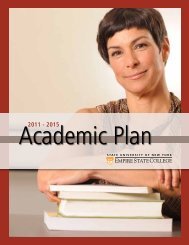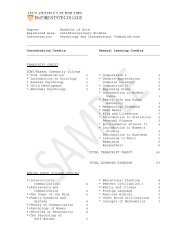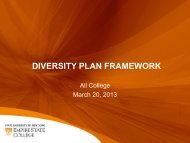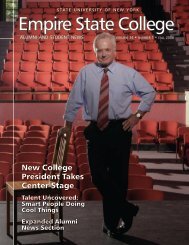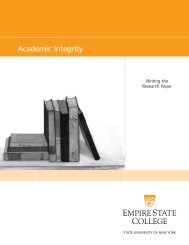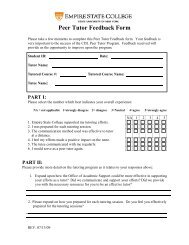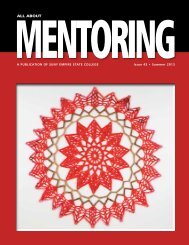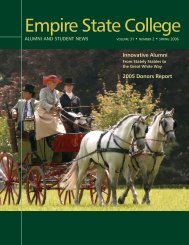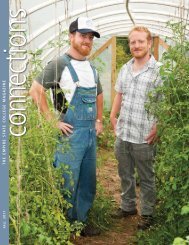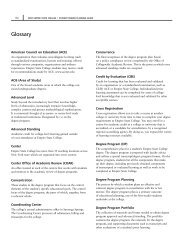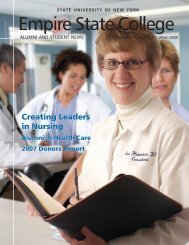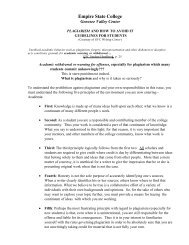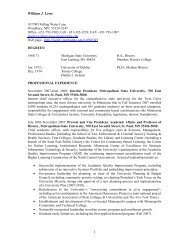All About Mentoring Spring 2011 - SUNY Empire State College
All About Mentoring Spring 2011 - SUNY Empire State College
All About Mentoring Spring 2011 - SUNY Empire State College
You also want an ePaper? Increase the reach of your titles
YUMPU automatically turns print PDFs into web optimized ePapers that Google loves.
84<br />
before the end of the study, but it was<br />
always a unique and engaging educational<br />
experience for the student.<br />
George warned us that the college would<br />
gradually be absorbed into the traditional<br />
methods of higher education and would<br />
look more and more like other colleges. He<br />
warned us to beware of the three terrible<br />
C’s: calendar, curriculum and classes. He<br />
was prescient. We now have terms, area of<br />
study guidelines and group studies. Much<br />
of his vision is gone. Yet, in the interaction<br />
between mentors and students, his spirit is<br />
with us still.<br />
Ken Cohen<br />
The college was four years old when I<br />
arrived at the Genesee Valley Center, and<br />
many things were in place while others were<br />
still developing. The notion of the college as<br />
an experiment was very much alive. Before<br />
I took the job, an acquaintance advised me<br />
that the college was too offbeat to survive,<br />
and another said that we would run out of<br />
adult students before long. I decided to take<br />
a chance that lasted several decades.<br />
The tales that could be told of those early<br />
days are many. One early spring day, we<br />
were visited by the dean who informed us<br />
that we had exceeded our student quota<br />
for the year, we couldn’t accept anymore,<br />
and we should find some other things to do<br />
(alas, a one-time occurrence). On another<br />
day, sitting with a couple of other faculty<br />
examining some weaving from a box that a<br />
student submitted for prior learning credits,<br />
the following dialogue ensued:<br />
Faculty member No. 1, a biology mentor:<br />
“What do think it’s worth … maybe<br />
4 credits”<br />
Faculty member No. 2, a human<br />
development mentor: “I think it might<br />
be worth 8.”<br />
Faculty member No. 3, a business mentor,<br />
“How about 6”<br />
<strong>All</strong>, “OK.”<br />
Good days.<br />
George Drury was a founding faculty<br />
member, one of those who carried the<br />
torch of humanistic education. He strongly<br />
influenced the viability of our college<br />
and the work that we perform. My most<br />
immediate memory of George is that he was<br />
a very gracious, sweet and gentle man, who<br />
had a warm, easy smile and a twinkle in<br />
his eyes. He took his role as resident faculty<br />
philosopher very seriously, and always could<br />
be counted on for a narrative at each faculty<br />
meeting about the meaning and purpose<br />
of our common endeavor. These oral<br />
comments were always followed up with<br />
a written commentary, The Prince Street<br />
Dialogues (something that I think would<br />
be called a blog in today’s argot), where<br />
he explored his views in greater depth.<br />
Frankly, many of these contemplations were<br />
too erudite for me to fully comprehend<br />
although I would be willing to try again if<br />
any copies of these papers come to light.<br />
His students had no such trouble grasping<br />
his presence and substance. Feedback from<br />
them consistently confirmed his calm,<br />
understanding manner, his desire to help<br />
them learn and grow, and the success of his<br />
efforts in moving them to higher intellectual<br />
levels. His learning contracts were never<br />
discrete, 4-credit blocks, but instead were<br />
holistic documents that would encourage<br />
expansive and integrative learning. Several<br />
years after I arrived, some faculty got the<br />
notion that we should offer small groups<br />
as a learning modality. I don’t think that<br />
George ever ran a group – one-on-one, faceto-face,<br />
customized learning was his way.<br />
For me, too, with all the changes in the<br />
college, the ability to work with students in<br />
this individualized mode was certainly the<br />
high point of my 30-plus-year career.<br />
The only time I saw George’s anger and<br />
sadness was when he needed to leave the<br />
college because of mandatory retirement-age<br />
mandates. He was not at all diminished in<br />
his capacities and he very much wanted to<br />
keep carrying on the work that he loved and<br />
fit him so well. His heart and mind were<br />
very much in the right place to provide a<br />
strong foundation for the college and to<br />
sustain our mission during his many years of<br />
service. I miss him.<br />
Lloyd Lill<br />
As one of the founding mentors of the<br />
Genesee Valley Learning Center, George<br />
Drury was a caring colleague who critiqued<br />
and examined the role and direction of<br />
centers and the college. George’s dialogues<br />
and discussions were always in support<br />
of mentors and mentoring, creating an<br />
atmosphere for students to learn and<br />
acknowledging the importance of meeting<br />
student needs.<br />
One of my memories of working with<br />
George is of co-mentoring a Xerox student.<br />
The student was studying the History of<br />
Economic Thought with me, and with<br />
George, An Introduction to Philosophy.<br />
I recalled the student’s excitement after<br />
meeting with George and how they<br />
discussed Socrates’ death in Plato’s<br />
Phaedo. George loved his students<br />
and they loved him.<br />
Traveling with George was always a<br />
challenge filled with many surprises. On one<br />
occasion, I was in a car with George, Peter<br />
McDonough and Larry Lipsett on our way<br />
to an <strong>All</strong> <strong>College</strong> Meeting. Our conversation<br />
turned to the creation of the universe<br />
and a supreme creator. George spent a<br />
considerable amount of time describing the<br />
Thomistic philosophy, the existence of God,<br />
and the first cause of the universe. Larry<br />
quietly announced he was an agnostic, and<br />
the next minutes were spent in utter silence,<br />
which was remarkable, for there were few<br />
times I remember George being silenced.<br />
Wayne Willis<br />
I first came to Rochester in the summer of<br />
1977 to interview for a one-year position<br />
at <strong>Empire</strong> <strong>State</strong> <strong>College</strong>, an internship in<br />
mentoring for newly minted Ph.D.s. I was<br />
excited by the possibility of working at a<br />
new college that had embraced so many of<br />
the ideas and practices associated with the<br />
“free school” movement of the ’60s and<br />
’70s. But I wondered whether I might feel<br />
intellectually isolated at an institution where<br />
there were no academic departments and<br />
where the faculty was divided into small<br />
regional clusters. When Bob Seidel, the only<br />
Genesee Valley Center mentor in Historical<br />
Studies, took me to lunch, I asked him how<br />
he dealt with this. Bob replied, “I talk with<br />
George Drury.”<br />
Over the next 10 years until his retirement,<br />
and after that on occasions when he<br />
and his wife, Finvola, would return to<br />
Rochester from their home in Maine, I<br />
learned that George could indeed talk<br />
with me on just about any subject that<br />
suny empire state college • all about mentoring • issue 39 • spring <strong>2011</strong>



